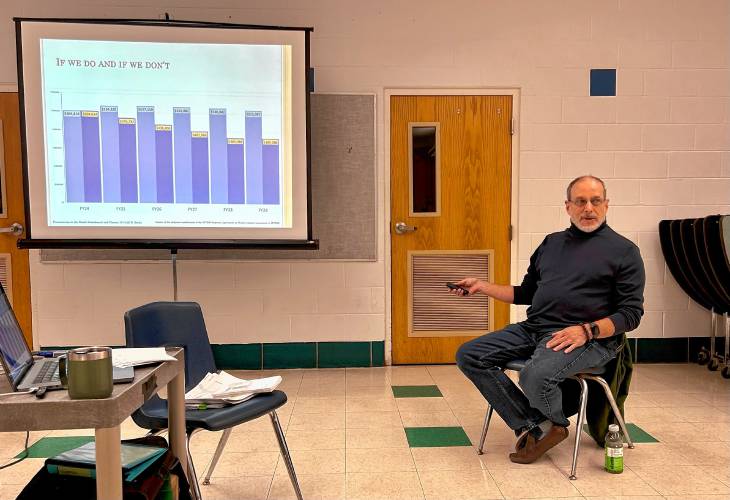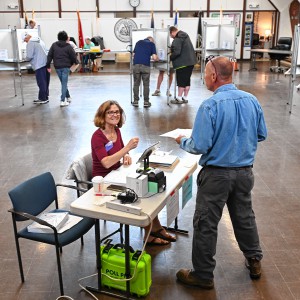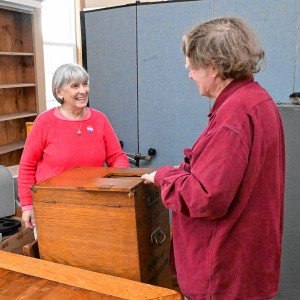Heath Finance Committee opposes Special Town Meeting on school assessment formula

Ken Rocke, a Heath resident with a background in public education, gives a presentation about how a proposed change to the Mohawk Trail Regional School District’s town assessment formula could impact Heath. STAFF PHOTO/BELLA LEVAVI
| Published: 10-13-2023 5:57 PM |
HEATH — The Finance Committee voted unanimously to not recommend holding a Special Town Meeting for the town to revote on changes to the Mohawk Trail Regional School District agreement, despite a request from the School Committee.
This vote came after Ken Rocke, a Heath resident with a background in public education, gave a presentation painting a grim picture for Heath’s future assessments, should the regional agreement be revised to change the town assessment formula to factor in out-of-district and School Choice students in determining each town’s share of expenses, as is proposed.
Rocke’s presentation included projected assessments that are between $163,000 and $171,000 higher than current assessments. However, these numbers are far higher than the net-change projections provided by the school district of about $19,000 to $37,000.
In a subsequent email to the Selectboard, Finance Committee Chair Tom Lively said the committee’s discussion, when considering whether to recommend holding a Special Town Meeting, “centered on needing the time to research and verify the article” presented by the Mohawk Trail Regional School District between now and the Annual Town Meeting next spring. Setting up a Special Town Meeting, he continued, “means a lot of extra work and expense for the town.”
The email went on to say, “I think we all know the difference in attendance between a STM and an ATM, and the ATM is the time and place to discuss these kinds of expensive changes” that will impact the town for years to come.
“We need time to prepare a proper presentation to/for all the voters of the town of Heath,” Lively continued in the email. “That should be our primary concern.”
Mohawk Trail Regional School District representatives came to all member towns about a month before the towns’ respective Annual Town Meetings requesting they vote to change the regional agreement. Town assessments are currently calculated by counting the number of students enrolled on a five-year rolling average in the Mohawk Trail Regional School District. This is called “complete enrollment.” Depending on the ratio of students enrolled over that five-year period, each town pays its share of the school district’s capital costs and operating expenses.
The revised agreement, which is 16 pages long and involves approving three Town Meeting warrant articles, would use “foundation enrollment” to calculate town assessments. Foundation enrollment numbers factor in School Choice students, residents who opt to attend a charter school and out-of-district special education students.
Article continues after...
Yesterday's Most Read Articles
Foundation enrollment is used by the state Department of Elementary and Secondary Education (DESE) to calculate funding allocations, and the School Committee argues these changes would result in a more equitable situation for the towns. Mohawk Trail’s regional agreement, the committee has noted, was written before School Choice existed in Massachusetts.
Six of the district’s eight member towns have approved the regional agreement changes, with the exception of Heath and Plainfield. However, the changes can’t take effect until they are approved by all eight member towns.
As the task of crafting a fiscal year 2025 budget will begin in the coming months, the School Committee wishes to know if it should factor in this new assessment method in the budgeting process.
In Rocke’s presentation, he explained Heath would be disproportionately affected by the change because of the high number of students who attend schools outside of the Mohawk Trail Regional School District. Heath has 30 students who attend Rowe Elementary School and Hawlemont Regional School, and 49 students enrolled in the district. By factoring these 30 students into the assessment, the money Heath owes to Mohawk Trail will be far higher than its recent assessments.
Rocke provided a graph showing that Heath’s assessment would be more than $125,000 higher than that of its closest counterpart (Shelburne) and more than $300,000 higher than that of Buckland on the opposite end of the range.
This year is the second year Heath students are using School Choice to attend Hawlemont Regional School instead of the tuition agreement they had had previously following the closure of Heath Elementary School in 2017.
Rocke mentioned three relatively equal “buckets” of money the school district receives per student: Chapter 90 state aid, required district contribution and above minimum contribution. Under the current agreement, the district receives Chapter 90 and required district contribution funds from students in School Choice and charter schools.
Under the revised agreement, the school district would receive funds from all three categories for out-of-district and charter students. This would make the district an extra $4,549 per charter school student and $18,587 per School Choice student.
In response, Mohawk Trail Regional School District School Committee Chair Martha Thurber, who was attending the meeting, said, “The idea we are making money on choice students is inaccurate.” The foundation budget, she said, is totally inadequate in terms of sufficiently funding the school district. This increase in funding from the three categories would not increase the overall school budget, but would change the portion paid by each town.
Rocke acknowledged that the issues the district faces when it comes to adequate funding come from declining enrollment and state aid that has not increased sufficiently.
“The eight towns in the district have more in common than what separates us,” Rocke said.
Rocke said school districts across the state function using both types of assessment formulas, and there are positive and negative arguments to be made on both sides.
The Selectboard will ultimately decide on whether to call a Special Town Meeting during its next meeting, scheduled for Tuesday.
Reach Bella Levavi at 413-930-4579 or blevavi@recorder.com.

 Political newcomer defeats Shores Ness for Deerfield Selectboard seat
Political newcomer defeats Shores Ness for Deerfield Selectboard seat New Salem election ushers in new Selectboard member
New Salem election ushers in new Selectboard member Bridge of Flowers in Shelburne Falls to open on plant sale day, May 11
Bridge of Flowers in Shelburne Falls to open on plant sale day, May 11 Community Legal Aid expands Disability Benefits Project to Franklin County
Community Legal Aid expands Disability Benefits Project to Franklin County
